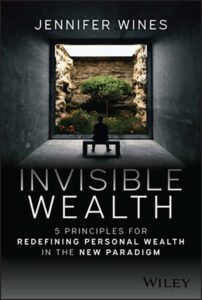
All of us aspire to manage our financial future, and that means defining our wealth goals. When we become clear on our wealth goals and create a specific plan to achieve them, our likelihood of succeeding will increase. Today, wealth management advisor and entrepreneur Jennifer Wines joins us to talk about her new book, Invisible Wealth: 5 Principles for Redefining Personal Wealth in the New Paradigm, where she takes us on an insightful exploration into reimagining and redefining wealth. Tune in and learn how to use the personal wealth algorithm to identify your values and wealth goals, optimize your most valuable asset, which is your time, and how technology can support your wealth and wellbeing. It’s time to reimagine and redefine what wealth means to you, so don’t miss this episode!
—
Listen to the podcast here
Invisible Wealth With Jennifer Wines
We’re going to be talking about wealth with Jennifer Wines and her new book, Invisible Wealth: 5 Principles for Redefining Personal Wealth in the New Paradigm.
—
Jennifer is a certified wealth management advisor and entrepreneur. She delivers an insightful exploration into reimagining and redefining wealth. This book explores the technological advancements and societal shifts that have us considering everything from digital assets to digital communities, all of which are organized around our individual values. Specifically, we’re going to be talking about the personal wealth algorithm to identify your values and your wealth goals, and also optimize your most valuable asset, which is your time, and how technology can support your wealth and well-being. I‘m excited to jump in and talk to Jennifer about Invisible Wealth. Jennifer, it‘s so great to have you here.
Thank you for having me. It’s such a pleasure. It’s good to see you.
I love books. This is all about books and lessons that we have learned in life. I want to jump in specifically to Invisible Wealth. Jennifer, why did you write this particular book?
That’s a great question and one that I honestly reflected on more so in retrospect ahead of time if that makes sense. If we rewind the tape a bit, I went to law school. After graduating from law school, I took the Massachusetts Bar and passed. As I was waiting for my bar results, I joined Goldman Sachs and its private wealth management group. I had a great opportunity to dive into wealth management as I was waiting for my bar results.
This was back in 2010. Do you remember where you were in 2010? It was an interesting time. The economy had gone kerplunk. We came out of this lofty recession. People were starting to find their footing. As it so happens, 2010 was arguably one of the worst years to graduate from law school on record. Here I am graduating from law school, bright-eyed and bushy-tailed. I come out, study for the bar exam for three months, take the exam, wait for my bar results, and apply to nonlegal jobs and legal jobs as an insurance policy. I got into a nonlegal job in private wealth management.
I was so fortunate, lucky, and grateful to join Goldman, and start to understand what the business of wealth management was. I got into wealth management. I had been in the space for over a decade. I have been to wonderful institutions like JP Morgan, Goldman, and Fidelity. Those were great ecosystems to dive in and understand what wealth is all about through the lens of the clients that I was advising.
I would advise ultra-high-net-worth individuals to help them to preserve and grow their assets. Through thousands of conversations, you start to get a sense of what people value, why and what makes them tick, how they interface with value, how they interface with money, and therefore how they interface with wealth. I started seeing that the conversations with clients were shifting.
What I mean by that is that the conversation was expanding beyond, “What can this investment get me as it relates to a return?” but more so, “What is it doing?” The conversation was shifting from numbers to numbers and narratives. They’re conversations around the values of the investment, not only the value. I started to see all these technological advancements and societal shifts going on.
I’m like, “The world is moving so quickly.” I thought to myself, “If there’s ever a time to throw my cards up in the air, take a risk, and leave the seat that I was in, it’s now,” which was leaving behind a great company, a great team, and great clients. It was a huge decision but I followed my intuition and my gut. I ultimately decided to leave my job in April 2022 with a book proposal in hand that I had been working on.
It was getting that infrastructure in place during the year leading up to my resignation and being a part of the Great Resignation. It was a few things. It was law school. It was me falling in love with the power of the written word. It was spending over a decade in the wealth management space, and then my self-exploration and observation that things are changing very quickly, and we’re redefining wealth. I thought to myself, “I’m going to roll the dice. Let’s do this,” and 2022 has been book-focused.
That’s fantastic. You and I connected in 2022 when you had your book proposal in hand. To go and specifically talk about your book, you brought up something powerful. It was not just about the numbers anymore. It was about the narrative. People were redefining what wealth looks like. That conversation is still being had, and you’re bringing that forth with your book. I want to dig in.
Now that you’ve written the book, Invisible Wealth: 5 Principles for Redefining Personal Wealth, what are some of the lessons that you’ve learned in those ten years? You truly acknowledge you have the credibility of the trifecta of being a lawyer, wealth manager, and entrepreneur. You’re bringing all of these worlds together. What are some of the lessons that you learned that you are sharing in your book about this new narrative plus the numbers and how that is important to people?
There are a lot of takeaways. That’s the intention of the book. It’s an invitation to reconceptualize what we value and therefore how we define wealth because everyone values things differently at a different point in time in their life. It’s not to say that this is the way we should be thinking about wealth. It’s more so that this is an invitation for you to define what wealth means for yourself.
Everyone values things differently at different points in their lives. Click To TweetWithin the book, I detail five principles. I lay out five principles. That’s the Invisible Wealth framework. These principles are for the frame of reference and what the book encapsulates. The first one is a wealth of money and investment. It’s numbers-focused. We want to acknowledge that financial wealth is a meaningful tool, and it impacts our life. I’m not here to say otherwise. That’s important. It’s a wealth of health and quality of life, a wealth of knowledge, status, and influence, and a wealth of time, energy, and experiences. Number five is a wealth of relationships with self and others.
These are fundamentally familiar constructs. I’m not bringing anything new to the table by listing these five principles but what I do is I look at each principle through a refreshed lens. It’s taking into consideration technological advances and societal shifts. It’s revisiting these five principles that embody the multi-definitional construct of wealth. Even more now than ever before, people are leaning into the wealth of health, for example. That exploration looks different now than it did 5 or 10 years ago.
Fundamentally, they’re familiar principles that deserved revisiting because so much is changing at warp speed. That’s the framework. Ultimately, the book journeys through these five principles and then lands on a personal wealth algorithm. The personal wealth algorithm is a set of instructions that people can use to define their wealth. The people that have read through the book, consider the points and information that I present, take what resonates, and scrap what doesn’t.
Once they get to the algorithm, hopefully, they have fresh in their minds these fundamentally familiar concepts although looking at everything through a refreshed lens and thinking to themselves, “With this in mind, this personal wealth algorithm can help me find my North Star as to what my concept of wealth is now.” Hopefully, that helps people to orient themselves in the world, and help to guide their actions, which thereby create and craft their life.
I would love for you to share that algorithm. Give us a living example of that and share a story of the algorithm and why it’s important in determining invisible wealth and these aspects. Can you share a little bit about that?
It’s a little bit tricky to talk to the algorithm because it is a series of steps but I do invite anyone to take a look in the book. It’s chapter ten. If you want to go straight to that chapter, go right ahead. Chapter ten details the personal wealth algorithm. I’ll share a story as it relates to perhaps my application of the algorithm.
Before you jump into that story, I want to invite everyone to go to Amazon.com or your local bookstore where you can find Invisible Wealth: 5 Principles for Redefining Personal Wealth in the New Paradigm by Jennifer Wines. Support Jennifer by going and purchasing the book. Please share your example.

Thank you so much for that. I appreciate it. This is the thing. As I mentioned before, I’m sitting in a seat in private wealth management. I have a great job. Honestly, I loved my job but something inside me said, “I’m valuing different things in my life differently these days.” During the pandemic, I was living in New York. I packed up all my stuff and put it into storage. This was in November 2020. A group of people, including myself, moved down to Miami together. Everyone got their little apartments. It was wonderful. I got on the plane. I had two suitcases. I’m ready to go.
I’m like, “Miami. Three months. This is going to be fantastic.” Play the tape forward. I’m there for two and a half years, and I never would have expected that. In the meanwhile, I started to realize, “New York against Miami, what are the things that I like about New York? What are the things I like about Miami? Working in an office versus working at home. What are the things I like about working in an office? What are the things I like about working in a home? Snow versus sunshine in December.”
You start going through these things. I’m giving these obvious examples. The point is that I was revisiting what I valued and why. I thought to myself, “I like the flexibility of being where I want when I want. I want to design my life so that I have that optionality in place because I’m placing a premium on that optionality. I’m placing a premium on being able to structure my time, the most valuable asset I have to interesting, meaningful, invigorating, and exciting things.” For me, at that point in time, that existed outside of 9:00 to 5:00 proverbially speaking.
I said to myself, “I’m going to take a risk.” This makes sense to nobody because they said, “You worked so hard to be here. What are you doing? You are crazy.” I had to ignore that and think about what was truly valuable to me and how I wanted to position myself to make money in a new way and structure my life in a new way. In retrospect, I used this framework to get to where I am to have the wherewithal to leave a job and to have a vision as to where I wanted to go.

That’s so important for people. What the pandemic did was a great reset for everyone to evaluate their personal values and what is important to them. People are in that process of, “What do I want to do? What makes me happy?” Those daily, weekly, or monthly reflections on what you value and where you want to spend your time are important. That is important with money as well, and the other wealth that you define in the book. This is the speed round. This is where I’ll ask you questions, and you share what comes up for you when I ask you a question. We will get started here. What is your legacy going to be?
I hope to be remembered as someone who always helped. That’s important to be a resource for people and help unconditionally. It’s critically important. It’s what makes the world go around.
I hope to be remembered as someone who always helped. I think it’s important to be a resource for people. Helping unconditionally is critically important to what makes the world go round. Click To TweetIt’s being of service. I love that. What about your favorite book?
Kahlil Gibran’s The Prophet.
Favorite author?
Perhaps Kahlil Gibran because that work is a masterpiece.
What are you reading next?
There are so many. I have a list of books to read. There’s the longevity book that came out by Attia.
That’s next on your list. It’s a book on longevity. Where did you hear about him?
It’s popcorning everywhere. He’s a very famous guy in the longevity space. I’m curious to see what gems he might share with us.
I know that you finished this book, and you’re launching this book. I‘m excited to talk about some of the podcasts and speaking opportunities that you have coming up. What are you going to write next now that you’ve written your first book? Do you have any ideas about what your next book is going to be on?
I’ve thought about it because this book is quite dense. Each chapter could be a book in and of itself. Perhaps there’s a doubling down of one of the chapters depending on the feedback I get, the information, and what resonates with people. I would love to go deeper into any of the topics because there’s so much that could be said in any of the chapters.
That’s fantastic. It’s the process of writing a book and realizing that you might be writing five books. I‘m in that process as well. It’s important. All of these subjects are so complex and nuanced. There’s a lot to be said about them. That’s why I want to ask the following question. Where can people find out more about you and learn more about you? Please share where they can follow you online.
I’m predominantly a LinkedIn person these days. LinkedIn is the eighth wonder of the world. It’s incredible. The content and the things that I share tend to resonate most with those on LinkedIn. I would say that or my website. You can find me and add yourself to the email list. I don’t send out a ton of stuff but when I do, it’s thought-out and potent. On YouTube, I’m starting to ramp up as well. I would say LinkedIn, YouTube, and email distribution.
What is your website?
It’s www.JenniferWines.com.
Finally, I would love for you to share a piece of advice or words of wisdom with our audience out there about your book Invisible Wealth and a message to inspire.
One little nugget that I’ll share is that fortunately, I got the book deal super fast. The publishing deal came to me. They said, “How fast can you write this book? We want it out in the spring.” With this being my first rodeo, I had no idea about how much time, magnitude, edits, typesetting, and all the things. I said, “I can have it for you on 10/10.” That’s when I had to hand in my manuscript. I signed my contract on September 6th, 2022. We were negotiating a bit before but I wrote the book in nine weeks. I had the foundation and everything ready to go but I did nothing except eat, breathe, and sleep this book. I’m so happy though that I said yes to the challenge.
That’s one of those things. People will come to you, and you will have opportunities presented to you. No matter how scary it is, say yes. You will figure it out, I promise. If you don’t know, reach out. You’re a coach. You’re great at these types of things. Just say yes. That was a big takeaway. On the other side of it, it’s getting comfortable with understanding that 60,000-plus words aren’t going to be perfect. You could rephrase things and let go of perfection.

I love it. Those are some great tips for those aspiring authors out there. Jump and the net will appear. I love that your publishing deal came along so quickly because I get that question all the time from people, “How do I get a publishing deal? What does it look like?” It’s so interesting because sometimes it could be fast like that. I have clients who are on TV and have reality TV shows, and they don’t get great publishing deals to come along.
Congratulations on getting your publishing deal with Wiley and launching your book. This is all great news. Thank you so much, Jennifer. It is wonderful to talk to you about your book. Everyone, go out and support Jennifer. Go to Amazon or your local bookstore and get Invisible Wealth. Thank you, Jennifer. Thank you, everyone, for tuning in to this episode. Take care, everyone.
Important Links
- Invisible Wealth: 5 Principles for Redefining Personal Wealth in the New Paradigm
- Jennifer Wines
- The Prophet
- The Science and Art of Longevity
- LinkedIn – Jennifer Wines
- YouTube – Jennifer Wines
About Jennifer Wines
 Born in Mexico, to an Irish mother and a Mexican father, Jennifer moved ten times by the age of twenty – all over North America. After law school, she embarked on a career in Private Wealth Management that immersed her into the world of immense wealth.
Born in Mexico, to an Irish mother and a Mexican father, Jennifer moved ten times by the age of twenty – all over North America. After law school, she embarked on a career in Private Wealth Management that immersed her into the world of immense wealth.
Jennifer worked at some of the top Private Wealth Management institutions in the world, namely Goldman Sachs, JPMorgan, and Fidelity. She earned her Juris Doctor from Suffolk University Law School in Boston and her Certified Private Wealth Advisor designation from Booth Business School in Chicago. While at Fidelity, she developed a proof of concept and prototype for an enterprise solution, which was advanced into incubation.
Her strong background with words (law) and numbers (finance), paired with her entrepreneurial spirit make her a trusted voice on the topic of redefining wealth, for the New Wealth Paradigm. Recently named one of the Top 100 Women of the Future, Jennifer is a former private wealth advisor who founded Invisible Wealth, which provides future-forward, consultancy services.
Invisible Wealth, the book, available Spring 2023. Publisher: Wiley.
Love the show? Subscribe, rate, review, and share! http://aliciadunams.com/
